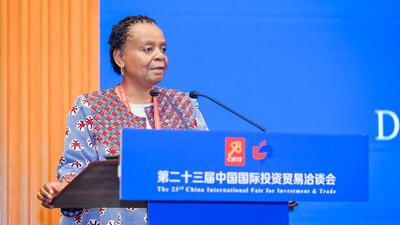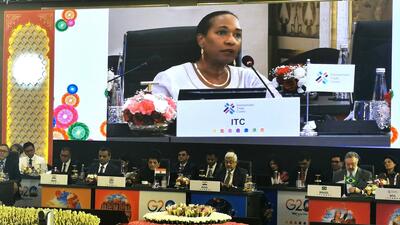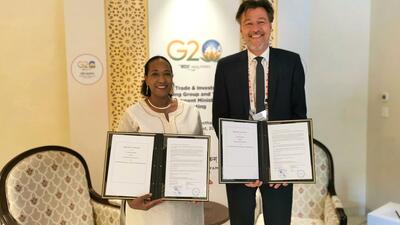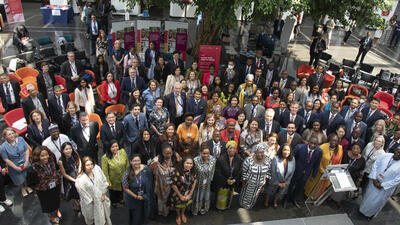The Nollywood experience: learning from Nigeria’s services success
Nollywood is one of the success stories that the service industry in Rwanda sought to draw lessons from during the second day of the World Export Development Forum (WEDF).
More than 800 delegates from 73 countries attended the first plenary session of the World Export Development Forum (WEDF) yesterday.
The final parallel session, which focused on the topic of ‘Trade in services: The next frontier’, emphasized the increasing importance of the services sector to drive GDP growth, reduce poverty, increase employment, fuel exports of value-added goods and attract foreign direct investment. Services account for roughly half of most national economies, and productivity gains in this sector make a greater potential contribution to sustainable economic development than those in other sectors.
Services account for close to half of world exports when the full value of services inputs is accounted for in the final output of goods. To be truly competitive, even in traditional sectors such as manufacturing and agriculture, countries must have a properly functioning services sector.
Entertainment as a service is ranked as one of the biggest growth areas for African SMEs. Rwanda’s young industry has registered some growth over the last ten years and to get to the next level, local entrepreneurs can learn lessons from Nigeria.
The Nigerian Film Industry, popularly known as Nollywood, rose from a cottage industry to raise over $100 million in sales in one country per year. Through a low-cost business structure, it is currently the second largest prolific film industry in the world after Bollywood.
Dayo Ogunyemi, CEO of 234 Media, said that despite the Nigerian success, the industry has been crippled by piracy in the last five years, and he attributed it to the exclusion of private sector in policy formulation.
Sandra Uwera, COMESA Business Council Coordinator, noted the same gap within the services committee in Common Market for Eastern and Southern Africa (COMESA) and the East African Community (EAC). Quality management is important in service delivery but remains a component that many overlook. Quality does not refer to goods only, but services as well. Service providers should be able to deliver quality and efficiency in a manner that can be sustained.
Ms. Uwera noted that many SMEs from the region cannot compete with their peers in both the regional and global markets due to the lack of standardisation. Many industries demand that standardisation requirements are met before entry into the market, a process that is sometimes too costly for SMEs.
The private sector should proactively seek inclusion in the policy formulation processes as opposed to leaving it to government. Although Mr. Ogunyemi has confidence in the ability of the private sector, he called for greater cooperation between policy makers and private sector.
When SMEs face a financial challenge to meet the standardization requirements, the answer is not to give up. Ms. Uwera advised that there is potential in partnering with other SMEs to share the costs and minimise the burden. ‘More is better,’ she said.
The current market is determined by tastes, preferences and choices based on purchasing power. Service providers must understand their clients and give what they demand.
Nollywood no longer concentrates on local clientele only. It has ventured into new territories. Technology has worked in its favour and the industry has been able to improve the quality of its services by bringing down the cost of production and easing the payment system.
Rwanda is one of the countries that have completed migration from analog to digital broadcasting and digitisation should be used to improve the payment system, bring down the prices, improve quality and upgrade devices.
Read the full summary of the final parallel session: Trade in services: The next frontier?
WEDF is organized by ITC, the only United Nations organization with an exclusive focus on assisting SMEs. The event is hosted by the Rwanda Development Board.















